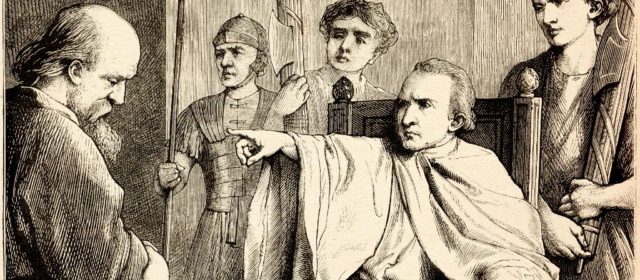“Even the dust of your city which clings to our feet, we wipe off in protest against you…” Luke:10:11 “Shaking the dust off the feet” was a common display of contempt toward Gentiles by the Jews. So ardently was their hatred of Gentiles, that even the dust that clung to the bottom of their sandals from Gentile territories was removed, as to not pollute their own “holy” land upon re-entering it. The Jews vaingloriously believed they were far better than Gentiles (all non-Jews) and presumed them to be unworthy of God’s attention. Perhaps their haughty behavior grew from the fact that they are God’s “chosen people” (Deut. 7:6, Isa. 14:2, 43:20); a “special treasure, above all peoples on the face of the earth” (Deut. 14:2);”…to whom belongs the adoption as sons and the glory and the covenants and the giving of the Law and the temple service and the promises...entrusted with the oracles of God.” (Rom. 9:4, 3:2b); and “…the apple of His eye.” (Zech. 2:8). Furthermore, God made a covenant with their father Abraham, an unconditional promise to make them a great people and give them and land and blessings (Gen. 12:1-3, 15:18-21). Israel was required to be lights to Gentile nations and to glorify the God of Israel. (Ex. 19:5-6). However, they behaved disobediently and miserably failed to represent God’s holiness to the pagan nations, often refraining from setting foot in Gentile cities. They even despised half-breed Jews; Jews and Samaritans who intermarried. If for instance, a Jew had to travel on foot from Judah to Galilee (approximately ninety miles), many times they bypass the significantly shorter route through the city of Samaria and trekking around it, would walk the extra distance. As with Gentiles, the Jews believed that setting foot in Samaria would defile them. Jesus, on the other hand ascribed a different meaning to the act of “shaking the dust off the feet”. He turned the Jews act of derision toward Gentiles, into a testimony and condemnation upon themselves for their rejection of Him as their Messiah. For example, when Jesus sent out His disciples to the lost sheep of Israel, He gave them the command: “…Do not go into the way of the Gentiles, and do not enter a city of the Samaritans. But go rather to the lost sheep of the house of Israel…And any place that does not receive you or listen to you, as you go out from there, shake off the dust from the soles of your feet for a testimony against them.” (Matt. 10:5b-6, 14). Luke’s Gospel adds Jesus stating: “Even the dust of your city which clings...
Read MoreWhen I contemplate the account of the “thief on the cross”[Luke 23:39-43], It usually is about the orthodox theology within the passage: “absent from the body and to be at home with the Lord.” (2 Cor. 5:8). And this theological belief would be absolutely correct. However, what I failed to understand [because I never heard it taught] was the proper identity of the newly redeemed criminal. Upon conducting further research on the passage, I discovered that the converted criminal crucified alongside Jesus 1 was not a “thief” [kléptés]as he is commonly referred, But instead he was actually a “robber” [léstés], which carries a significantly different meaning. R.C. Trench defines: When I contemplate the account of the “thief on the cross”[Luke 23:39-43], It usually is about the orthodox theology within the passage: “absent from the body and to be at home with the Lord.” (2 Cor. 5:8). And this theological belief would be absolutely correct. However, what I failed to understand [because I never heard it taught] was the proper identity of the newly redeemed criminal. Upon conducting further research on the passage, I discovered that the converted criminal crucified alongside Jesus 1 was not a “thief” [kléptés]as he is commonly referred, But instead he was actually a “robber” [léstés], which carries a significantly different meaning. R.C. Trench defines: “kléptés and léstés…both appropriate what is not theirs. But the kléptés does so by fraud and in secret, the léstés does so by open violence. The former is a ‘thief’ and the latter is a ‘robber’…No passage has suffered more seriously by confusing thief and robber than Luke 23:39-43 [“the thief on the cross”]. The previous moral condition of the penitent thief, is obscured by the associations that clings to his name. Both malefactors crucified with Jesus, (one was inflexible, the other penitent) probably belonged to the band of Barabbas who had been cast with his fellow insurgents into prison for murder and insurrection (Mark 15:7). Barabbas was a léstés (John 18:40), not a common malefactor but a ‘notorious prisoner.” 2 In closing, by understanding that the “thief [robber] on the cross”, was a flagrant and villainous criminal, rather than a furtive and non-violent one, adds profundity to the forgiveness Jesus held out to him: “Truly I say to you, today you shall be with Me in Paradise.” (Luke 23:43). Although he received a physical death sentence, Jesus granted him spiritual clemency. Instead of receiving eternal condemnation, he was provided heavenly accommodation. Prior to conversion, we were all “robbers on the cross”. We were flagrant sinners against God, who mercifully received God’s saving grace: “But you were washed, but...
Read MoreWhen Christians are asked to name the first biblical counselor recorded in the Bible, Noah is usually not considered. When most believers think of Noah, they imagine his feat of constructing an immense Ark (Gen. 6:13-16), his collecting and stowing two of every animal species (Gen. 6:19), and the six months he was adrift while God destroyed the entire human race with a global flood (Gen. 7:24, cf. 7). During the time of Noah, God’s judgment fell upon the earth because mankind was utterly evil: “Then the LORD saw that the wickedness of man was great on the earth, and that every intent of the thoughts of his heart was only evil continually.“(Gen. 6:5, cf. 6:5-7). Despite the ubiquitous evil generation that inundated Noah, he remained untarnished: “…Noah found favor in the eyes of the LORD…was a righteous man, blameless among the people of his time, and he walked with God.” (Gen. 6:8-9b–NIV). Amazingly, only eight people survived the Great Flood while residing aboard the Ark Noah had built and all eight of those people were members of Noah’s family, including himself (Gen. 6:18, 7:1). Incredibly not only did God ordain Noah to be a master ship builder, zookeeper, and commissioned seafarer; he was also called to be a preacher and shepherd to the people (2 Pet. 2:5). Furthermore, Noah lived a total of 950 years; 600 years prior to the flood and 350 years after (Gen. 9:28-29), so he would have had the unique opportunity to minister to mankind, both before and after the flood. However, before the historic flood took place; “Now he [Lamech who begot Noah] called his name Noah, saying, ‘This one will comfort us concerning our work and the toil of our hands, because of the ground which the LORD has cursed.'”(Gen. 5:29-NKJ). The effects of God’s curse upon the land (Gen. 3:17-19) weighed heavily upon mankind so men sought relief–Noah provided that relief. Dr. Allen Ross notes: The name Noah is also the basis for the motif of resting, in the next tól edόt section of the book. Life under the curse was very painful for those early bearers of the curse, and so Lamech hoped for relief and comfort through this man Noah. Human life under the curse was also painful to God, and so God used Noah as part of His plan to relieve the world of pain, but not as Lamech thought, 1 Though we do not know the specific details of just how Noah provided comfort and rest to those who labored in that generation, yet the prophetic words of his father Lamech; “This one will comfort us...
Read More“For as the heavens are higher than the earth, so are My ways higher than your ways, and My thoughts than your thoughts.” Isa. 55:9 When many Christians ponder the account of the “thief on the cross” [actually “robber”], 1 they might overlook a powerful truth regarding the amazing nature of God’s forgiveness (Luke 23:39-43). Attention is typically given to the thief’s immediate presence with the Lord in heaven upon his death: “absent from the body and to be at home with the Lord.” (2 Cor. 5:8). Although this is a crucial truth to comprehend regarding the believer’s soul immediately upon death, another certain truth that could be drawn from the passage (Luke 23:39-43)–God’s profound pardoning of a sinner! All four Gospels record Jesus crucified between two criminals, one on His right and the other His left (Matt. 27:38, Mark 15:27, Luke 23:32, John 19:18). During the initial hours of the crucifixion, both robbers hurled insults at Jesus (Matt. 27:44), but as their life blood drained from their dying bodies one of them was converted and believed in Jesus as Savior. Because the unregenerate robber continued to “blaspheme” Jesus [Luke 23:39], the newly redeemed one rebuked him:”…Do you not even fear God, since you are under the same sentence of condemnation? And we indeed justly, for we are receiving what we deserve for our deeds; but this man has done nothing wrong.”(Luke 23:40-41). Only moments prior he was an unbelieving condemned criminal, but as a newly transformed saint he affirmed Jesus’ innocence rightly “fearing” God. Turning to his merciful Savior he humbly pled: “Jesus, remember me when You come in Your kingdom!” (Luke 23:42). When he uttered these words, Jesus revealed His compassionate heart. Even as Jesus was enduring His Father’s infinite wrath for the weight of the world’s sin, He mercifully said to the penitent sinner: “Truly I say to you, today you shall be with Me in Paradise.” (Luke 23:43). Would it not be comforting to have Jesus personally assure your salvation? Think of the mercy and grace Jesus had for that criminal despite having the knowledge that his entire life up until that point consisted of violent lawlessness. This example defies human reasoning (cf. Jer. 34:34, Heb. 8:12, Rom. 5:8). To Jesus, the robber’s wretched past did not matter–He had wiped his slate clean. This incredible promise is indeed true for “all” who put their faith in Christ (cf. Jn. 6:37, 40). God’s grace is truly amazing! Another potentially overlooked act of God’s forgiveness occurred the moment Jesus died on the cross, Scripture reads: “…the veil of the temple was torn in two from...
Read MoreThe Jewish Leader’s Vain Attempts to Silence Jesus’ Resurrection. who by the mouth of Your servant David have said: ‘Why did the nations rage, And the people plot vain things? The kings of the earth took their stand, And the rulers were gathered together Against the LORD and against His Christ.’ Acts 4:25-26 . When Jesus was taken down from the cross, laid in a tomb and a large stone rolled in front sealing the entrance (Matt. 27:57-60), a time of monumental folly and futility from the Jewish leaders ensued: Now on the next day [the Sabbath], which is the one after the preparation, the chief priests and the Pharisees gathered together with Pilate, saying ‘Sir, we remember that when He was still alive that deceiver said, ‘After three days I am to rise again.’ Therefore, give orders for the grave to be made secure until the third day, lest the disciples come and steal Him away and say to the people, ‘He has risen from the dead,’ and the last deception will be worse than the first. Pilate said to them, ‘You have a guard; go, make it as secure as you know how.’ (Matt. 27:62-65–brackets added). However, the flagitious plot of the chief priests [Sadducees] and Pharisees backfired. They were so concerned about Jesus’ disciples proclaiming to the nation “He [Jesus] has risen from the dead”, that they grossly underestimated the power of God. For after three days God raised Jesus from the dead and He appeared not only to His disciples, but to over five hundred witnesses over a forty day period, as recorded in Scripture (Acts 1:3, 1 Cor. 15:5-8). Furthermore, God made certain many more would testify to the power of the resurrection: “the tombs were opened; and many bodies of the saints who had fallen asleep were raised; and coming out of the tombs. After His resurrection they entered the holy city and appeared to many.” (Matt. 27:52-53). God’s omnipotence was demonstrated in that supernatural event, when hundreds, if not thousands witnessed the truth of the resurrection. Meanwhile, the women went out to the tomb to anoint Jesus’ body with spices, but were astonished to see that it was empty; for an angel from heaven had rolled away the stone from the entrance revealing an empty tomb. Speaking to the women the angel said: “Do not be afraid; for I know that you are looking for Jesus who has been crucified. He is not here, for He has risen, just as He said. Come, see the place where He was lying. And go quickly and tell His disciples that He has risen...
Read MoreRegarding John the Baptist Jesus earnestly declared, “Truly, I say to you, among those born of women there has not arisen anyone greater than John the Baptist… [Matt. 11:11], yet there is very little written exclusively on this “great” man and the significance of his ministry. When the angel Gabriel appeared to Zacharias, he declared that his son John [the Baptist], was to be a Nazirite 1 and forerunner of the incarnate Christ–the herald for the coming of God to earth. (Luke 1:13-17, Jn. 1:6, 14). In other words, John was to pave the way for the Lord Jesus Christ. Amazingly, in eternity past Christ was in full glory and equal with the Father, but He emptied Himself, took on flesh and humbly ministered to mankind on earth. (Jn. 17:5, Phil. 2:6-7, Jn. 1:14, Luke 4:17-18). It’s mind-boggling to contemplate, that the God of the universe employed a mere man [John the Baptist], to be the precursor for His Son, Jesus Christ. In the prologue 2 to the John’s Gospel [the first eighteen verses], John the Baptist is referenced four times (Jn. 1:6, 7, 8, 15). The prologue is very important to John’s Gospel, because it outlines: 1) The eternal Christ (vv. 1-3); 2) the incarnate Christ (vv. 4-5); 3) the forerunner of Christ (vv. 6-8); 4) the unrecognized Christ (vv. 9-11); 5) the omnipotent Christ (vv. 12-13); and the glorious Christ (vv. 14-18). 3 Interestingly, the heretical system of Roman Catholicism deifies Jesus’ mother Mary and she sparsely appears in Scripture. John the Baptist on the other hand, is referenced numerous times in Scripture, yet there is little recognition of his greatness in the sphere of Christianity. This seems antithetical to the teachings of Jesus, who frequently gave strong testimonies to John and his ministry. For example He proclaimed: “You have sent to John, and he has borne witness to the truth But the witness which I receive is not from man, but I say these things that you may be saved. He was the lamp that was burning and was shining and you were willing to rejoice for a while in his light.” (Jn. 5:33-35). Jesus also declared: “But why did you go out? To see a prophet? Yes, I say to you, and one who is more than a prophet.” (Matt. 11:9). And: “For John came to you in the way of righteousness and you did not believe him; but the tax-gatherers and harlots did believe him; and you, seeing this, did not even feel remorse afterward so as to believe him”. (Matt. 21:32). In John chapter five Jesus names John the Baptist as one...
Read More“…and you, being a wild olive, were grafted in among them and became partaker with them of the rich root of the olive tree.” Rom. 11:17 I am a “Gentile” [non-Jewish] who is considered a son of the God of Israel, adopted into His family and an heir of promise, held tightly to His bosom forever (cf. Rom. 8:17, 35). By God’s sovereign mercy and amazing grace, I was called and granted the faith to believe in His Son, Jesus Christ. It is because of His [free] gift of grace that I’m exceedingly grateful. As a Gentile, I am considered a “wild olive branch”, 1 that has been supernaturally “grafted” 2 into the natural “olive tree”,3 to share in the “richness” 4 of God’s covenant blessings. Supported by the olive tree’s “root”, 4 I, like all elect non-Jewish believers, add to the countless spiritual descendents of Abraham God promised to bless (Rom. 11:17, Gen. 12:2, 15:5, 17:4-5, Gal. 3:7-8, 29). Astonishingly, I’m like one of those innumerable stars in an evening sky, that God challenged Abraham to calculate (Gen. 15:5). In the covenant God made with Abraham, He promised through Abraham’s “seed”, that all of mankind would be blessed (Gen. 12:3, 22:18): “And the Scripture, foreseeing that God would justify the Gentiles by faith, preached the gospel beforehand to Abraham, saying, ‘All the nations shall be blessed in you.'” (Gal. 3:8). God has kept that promise, for all Gentiles [and all men] who have faith in Jesus Christ, are considered “spiritual” descendants of Abraham: “And if you belong to Christ, then you are Abraham’s offspring, heirs according to promise.” (Gal. 3:29, cf. 3:8, 25-28). However, one day in the future, Abraham’s “physical” seed “all” Israel, will believe in the Messiah Jesus and become God’s “spiritual” children as well (Rom. 11:26-27). The nation of Israel was uniquely chosen by God to receive His “special” love and set apart from other nations, requiring them to remain faithful and obedient only to Him (Deut. 7:6-8, Ex. 20:3-6). Tragically, Israel failed miserably to keep God’s commandments and repeatedly tested His patience by their rebelliousness and idolatry, thus provoking Him to anger (Deut. 32:21). One of the ways God brought judgment against Israel, was by demonstrating mercy to the Gentiles. He offered them salvation and through prophets informed Israel of His intentions (Deut. 32:20-21, Isa. 65:1-3a). Therefore, I am grateful for Israel’s disobedience and subsequent judgment by God, realizing it’s because of their disobedience that I have obtained God’s mercy. Not that I sinisterly exult in Israel’s punishment because of their sin against God, as many nations had done–for example...
Read More“Blessed are they who did not see, and yet believed.” Jn. 20:29 The question many Christians wrestle with is did God create the universe, in billions of years or in six twenty-four hour days, according to Genesis chapter one? The various answers given to this query have been the subject of theological debates for numerous years. Many who are fastidious to the veracity of Scripture, surprisingly balk at God’s claim to the creation account in Genesis one. Moreover, it is especially disturbing to learn that a vast majority of Christian teaching institutions, have abandoned the ostensive teaching of Genesis 1-3. Dr. John MacArthur, president of The Master’s Seminary observed: “I recall reading a survey a few years ago which revealed that in one of America’s leading evangelical accrediting associations, whose membership boasted scores of evangelical Bible colleges and universities, only five or six college-level schools remain solidly opposed to the old-earth view of creation. The rest are open to a reinterpretation of Genesis 1-3 that accommodates evolutionary theories.” That said, if you interpret the creation account of Genesis literally and in context, you will unquestionably end up with a six twenty-four hour day creation: “And there was evening and there was morning, one day.” The wording in the Bible is not only crystal clear, but fundamental regarding God’s miraculous creation account. The following points in this short article are for the student of Scripture’ consideration, to help determine the feasibility and probability of a six-day creation. Yom “…And there was evening and there was morning, one day.” Gen. 1:5 When the creation account in Genesis one is taken in context, the Hebrew word yom [day], clearly means a twenty-four hour period: “And there was evening and there was morning, one day.” (Gen. 1:5, also see 1:8, 13, 19, 22, 31). One needs not be a Hebrew scholar, in order to understand that God communicated much of Scripture, especially the creation account, in a simplistic manner. Interestingly, He also employed a similar simplicity [in the New Testament Greek word construction] in the Gospel of John, so that there would not be any doubt as to Jesus Christ’ deity (Jn. 1:1-4). However, despite the unambiguous translation from Hebrew to our English versions of Genesis one, many professing Christians deny, that the Bible claims a six twenty-four hour day creation. For instance, they interpret yom [day], in Genesis one, to mean exceedingly long periods of time e.g., millions and millions of years. Dr. Allen P. Ross commenting on yom [day] made this assertion: “The meaning of the term “day” [yom]…can…mean a longer general period of time (Isa. 61:2)…however, it [yom], in...
Read More“…James and Cephas and John, who were reputed to be pillars, gave to me and Barnabas the right hand of fellowship, that we might go to the Gentiles…” Gal. 2:9 It’s amazing how the Gospel of Jesus Christ unites people of various ethnicities, genders, cultures, and social statuses, into one equal organism the church (Eph. 4:16). It’s also fascinating to witness a congregation made up of those distinctions, worshipping the same God through Christ. Apart from the unifying blood of Christ, it would be highly unlikely that such a diverse group of people, would assemble under the same roof and of one accord. That is because God shows partiality to no man and recognizes no distinctions (Acts 10:34, Rom. 2:11, Gal. 2:6, Eph. 6:9, Col. 3:25). All who believe in Him sins are forgiven and stand perfectly equal in the eyes of God. Perhaps no group of people experienced the transforming power of the Gospel, more than the believing Jews of the early church. Throughout biblical history Israelites despised Gentiles and had a deep-seated hatred for them, commonly referring to them as “dogs”. During biblical times dogs were not kept as pets and were filthy animals that roamed the streets as scavengers; they were considered “unclean” by Jewish people. To further illustrate their prejudice, if a Jew had to travel [on foot] from Judah to Galilee [approximately ninety miles], they would bypass taking the significantly shorter route through the city of Samaria (Samaritans were Jews and Gentiles mixed through marriage). Because Jews despised the “half-blooded” Samaritans so vehemently, they believed setting foot in Samaria would defile them. Even Gentiles who became proselytes [converts to Judaism], had a designated area in the temple courtyard, known as the “court of the Gentiles”. Gentiles, under no circumstance were allowed inside the temple. Looking to bring charges against the Apostle Paul, the Jews [falsely] accused him of bringing Gentiles into the temple (Acts 21:28). This was the main reason why a riot over Paul in Jerusalem and was attacked and severely beaten in the process. These Jews considered Paul to be a traitor. He most likely would have been killed, if not for the intervention of Roman soldiers who came to his rescue. Under the soldiers protection, Paul was able to speak to the hostile mob. He almost persuaded them with his words, for they intently listened to what he had to say, until he mentioned the Lord sent him to preach the Gospel to the Gentiles (Acts 22:21-23). When he mentioned the Gentiles, the multitude again began to furiously threaten him with violence, while screaming “…’Away with such a fellow from...
Read More“Now the chief priests and the whole Council kept trying to obtain false testimony against Jesus, in order that they might put Him to death” Matt. 26:59 The year was 155 A.D. when Polycarp, the bishop of Smyrna, (the same church as found in the book of Revelation), at eighty-six years of age, was martyred for his faith. Moreover, he was a devout disciple of the Apostle John, who himself was one of the twelve disciples of Jesus Christ. Polycarp was brought before the Roman Proconsul,1 who sternly warned him to renounce his belief in Jesus Christ. He was strongly advised to repent from his alleged “atheism” and to audibly proclaim, “Swear by the fortune of Caesar; repent, and say ‘Away with the atheists!'” [indicating the Christians]. Polycarp gazed intently at the godless, bloodthirsty and pagan multitude that filled the arena, and gesturing towards them, he said, “Away with the Atheists!” The proconsul insisted; “Swear and I will set you free – revile Christ!” Polycarp answered, “Eighty and six years I served Him and he has done me no wrong. How can I blaspheme my King and my Savior?” Polycarp displayed bold allegiance to Christ, in both his interrogation and in his martyrdom–while they attempted to burn him alive at the stake, they plunged a spear into him when the flames did not kill him quick enough. Polycarp, more godly then all present including the proconsul, was accused of the most heinous form of evil that a Christian could be accused of, “atheism”. In essence, Satan himself could not have written a better script. There never was a man as innocent as Jesus Christ and never will be, yet He was unjustly arrested, brutally beaten, and sentenced to be crucified. Why, because the Jewish leaders hated Him and were envious of Him: “For he [Pontius Pilate] knew that because of envy they [Jewish leaders] had delivered Him up.” (Matt. 27:18–brackets added). In the darkness of the night, Jesus was hurriedly subjected to a mock trial before the Sanhedrin [the highest Jewish court] and falsely accused of committing evil–even though no formal legal charges were brought against Him. Two false witnesses were brought in to testify against Him and perjuring themselves, claimed: “This fellow said, ‘I am able to destroy the temple of God and to build it in three days.’ “ (Matt. 26:61). Incomprehensibly, Jesus was accused of committing evil, when He was actually teaching the “good news” of God’s kingdom–for that He was executed! A few years after Jesus was crucified, Stephen, a devout follower of Jesus, was martyred by being stoned to death...
Read More

![The “Thief” [Robber] on the Cross](https://engedisgate.com/wp-content/uploads/2019/04/crosses-014-640x280.jpg)






